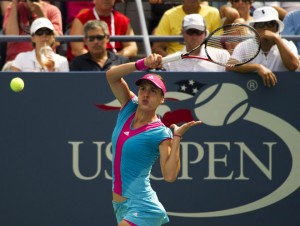By Thomas Swick
swickt@bellsouth.net
During a lull in the first set of the Andrea Petkovic-Zheng Jie match on the Grandstand court I inventoried the contents of the shelf below the umpire’s chair (items that had escaped my attention during the Radwanska-Kerber match the night before). It held a gray box that looked like a possible first-aid kit, two black telephones (I hoped nobody would call during a point), a bottle of Evian, what looked like a lotion dispenser, and a box of Kleenex.

Petkovic took a bathroom break after losing the first set, and the man sitting in front of me predicted that would be it. “Her father didn’t want her to play,” he told me in a German accent, explaining that she had injured her knee in Cincinnati. (A tough town, Cincy, between Petkovic’s knee and Nadal’s fingers.) “But,” the white-haired gentleman said, “these players have heads like cement.”
Petkovic not only returned, she won the second set after falling behind love-3. Then she won the third, turning the expression on her father’s face – he was sitting in the next section – from one of parental consternation to one of relief, and vague parental pride.
I had requested an interview with Petkovic, a woman who has fascinated me ever since I read that her favorite writers are Goethe and Oscar Wilde. It was moved from 6 to 6:30, allowing me time to attend the daily media cocktail hour. Yes, we get cocktails, and chips and salsa (never drink and write on an empty stomach), and crudités with blue cheese dip. I gulped my drink and headed to interview room 3, where two reporters already sat holding their microphones inches from Petkovic’s mouth. She finished her answer to the young man in the press hat (he was actually wearing a small fedora with a card that read “Press” sticking out of the band), then she stood up and, taking a couple steps in my direction, held out her hand and introduced herself. This was totally unnecessary – having requested the interview, I knew who she was – and unbelievably classy.
The early birds got the questions, which came fast and uncomplicated: “Who are you closest with on tour?” (“The German girls – and Ana Ivanovic.”) “Who is the funniest player?” (“Sania Mirza.”) When asked about her reading, Petkovic said she had two books going at the moment: “Don Quixote” and “Mediations on the Roman Empire” by Marcus Aurelius. This may have marked the first time in the history of modern tennis that the name Marcus Aurelius was mentioned in an interview room.
She answered all the questions, even though she’d probably heard them hundreds of times – with a freshness and an almost girlish enthusiasm. She talked about movies; she was a fan of “artsy films,” mentioning Almodovar’s as particular favorites, and said that, after tennis, she might like to try her hand at filmmaking. Writing was also an interest (“but not about tennis”). She didn’t drink – “because of my profession” – so often served as the designated driver for friends. (She kept her car supplied with music and snacks, including gummy bears, which, she claimed, are excellent in Germany.)
The other reporter asked her if tennis players “have less fun” than they could have – obviously thinking of players other than the one seated in front of us – and Petkovic said: “I think we get caught up in our job,” then added that that’s not unique to tennis players. Who, I thought, are engaged in a job – hitting a tennis ball – that most people think of as play, hence the conviction that they should be having a blast.
I have often wondered if Petkovic’s Renaissance woman approach to life was perhaps a handicap in tennis, which, like all sports, demands a dogged, single focus. Can a reader of Cervantes win the U.S. Open? But I didn’t want to suggest to her that she become a dullard to raise her ranking, and anyway we had run out of time.
I headed outside – another beautiful evening in Flushing Meadows – and caught a bit of the action in Arthur Ashe. Wandering through the food court, I heard a roar coming from Court 17. Arriving on the scene, I found the crowd on its feet, cheering a weary Gael Monfils.
“This had to be the longest day of his life,” usher Brian Potter said, explaining that, earlier, Monfils had lost a nearly five-hour, five set match. He had lost this doubles match too, but it was impossible to tell.
He pulled off his shirt and tossed it into the stands.
Potter told me that, for his last serve, Monfils had patted the ball in and, while his partner Marc Gicquel stood off to the side, laughing, their opponents ran Monfils back and forth with soft shots.
We looked back to the court. Monfils, in a fresh white T-shirt, had picked up a large gray umbrella and was carrying it to the other side of the court, where he handed it to fans. (Why should the folks behind the umpire’s chair get all the gifts?) Coming back, he picked up the box of Kleenex from under the umpire’s chair and tossed IT to the crowd. Cheers once again pierced the night air in appreciation of a man the next day’s papers would erroneously call a loser.
